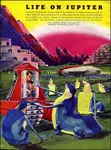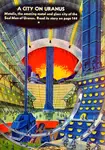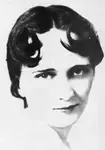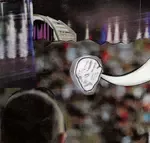Edmond Hamilton
and the old solar system
[ + link to: The Valley of Creation ]
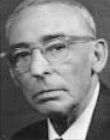
A well-loved classic author, whose works are full of zest and a pure appreciation of deep space, far horizons and adventurous souls. He is above all the feller whom you can trust to know what the Solar System ought to be like. His style matured during his fifty years of writing, from the verbosity of his 1920s and early thirties tales, to the mature, sophisticated yet ever more readable flow of his late masterpiece, the (non-OSS) Starwolf trilogy.
An example of his early, gosh-wow, nigh-unreadable verbosity:
The mighty note rang suddenly out from somewhere far beneath us, mighty, compelling, like the note of an inconceivably titanic bell, and at the same instant Carson snapped down upon the little metal disk's top, the white-handled lever in his grasp! There was a tremendous clear humming from beneath, and as it sounded, Carson leaped towards us, through the cylinder's door, which a moment later snapped shut as I pressed on the stud I held! Then the next moment blinding, dazzling light was stabbing up from beneath and all about us, a colossal ray of inconceivable brilliance that seemed to grip the cylinder, to stab upward with it at velocity inconceivable, all things that we could see vanishing instantly from about us, save the moon's bright disk above. Our moment had come at last, and at almost the speed of light itself we were flashing out into the void of space toward that disk - out from earth to moon! [from The Other Side of the Moon (1929)]
Thirty years later, however, he wrote like this:
...All he had to do was go on. But there didn't seem to be much point in that. He could not go any farther on foot, and he could not go any farther anyway without food and water. He might as well get himself decently killed in Llona as perish from thirst and exhaustion in the valley. With any luck - well, let's face it, with an enormous amount of luck - he might be able to steal the supplies he had to have, without getting caught.
He let go of the wall and went quietly, very quietly, into the dark village.
He made it to the well. He took the twisted rope in his hand and let the leather bucket down slowly, slowly, and drew it up again the same way, whispering to it, pleading with it not to clatter against the side of the well. Drops of water splashed with beautiful little wet noises. He got the bucket onto the coping and put his arms around it and thrust his face down into it and drank, sobbing and sucking in a sort of blind ecstasy...
That last passage is from World of Never-Men, set on Mars. But in his most mature phase Hamilton seems most at home among the stars, forsaking the Solar System, though his OSS work remains infused with the same enthusiastic quality that marks all he wrote. He makes no demands on his readers -
Stid: Surely, that is a backhanded compliment, to say that about a writer.
Zendexor: Not in this case. Here I simply mean that he is so tuned in to what the real dyed-in-the-wool sf fan wants, that (to such a reader) he is like a friend talking, a yarn-spinning spell-binding friend with whom one can relax, trusting that one is in the right universe where life unfurls to the wonders of space -
Harlei: And of our own Earth.
Zendexor: Yes, you make an important point there. A number of Hamilton's tales give us a special "take" on Earth - on our planet's future status and its fate.
He encourages our minds to bounce from Earth to Space and back and forth again...
Harlei: I used to get excited by the titles of some Hamilton stories, including the early ones which turned out to be disappointingly unreadable like the first example you quote from, or like the infuriatingly verbose exclamation-mark-ridden space-battles in The Universe Wreckers, which promised a trip to Neptune and then badly let me down by showing that planet to be just a deserted, boringly built-up world-city. So, to avoid such disappointment, can we pinpoint exactly when it becomes worth while to track his stories down? I mean, to put it crudely, when does he become the wonderful storyteller whose tales we crave to read?
the turning point
Zendexor: I reckon we can pinpoint the change down to a year - the year 1932. That's not to say that he wrote nothing worth reading before then, or that what he wrote afterwards was perfect. But in my judgement, the improvement at that time was dramatic. You can tell the difference by comparing Volumes Three and Four of The Collected Edmond Hamilton - the superb edition of his work currently being issued by Haffner Press.
To give one example: 1932 saw his groundbreaking A Conquest of Two Worlds, a gripping tale of discovery and conquest, of idealism, greed and tragedy, involving Earth, Mars and Jupiter.
Harlei: I'd rather you gave more than one example.
Zendexor: You'd rather I mentioned a less well-known story, eh? To show that the leap forward in 1932 was more than a matter of a one-off success, let me then cite a tale which I'd never even heard of before I obtained a copy of Volume Four of the collected works.
It's a tale which embodies the freshness and wonder of the early science-fictional solar system, and confirms one's sense of the Hamilton oeuvre as a vast, under-explored swathe of that golden past-future, where treasure for the reader is strewn around for the taking.
I refer to The Terror Planet, just over 30 pages long, which takes us on the first trip from Earth to the planet Uranus.
Yes - Uranus! Not such a neglected world as I used to think!
"Do you mean to say, Hunt, that you, an astronomer, are talking seriously of a visit to one of the most distant worlds of the solar system?"
Hunt's eyes were unwavering. "I mean just that."
"But how - what -" I attempted, when he interrupted.
"I know just how the idea must seem to you, Devlin, but I want you to hear me before you consign me to a mental ward.
"In the first place" - Hunt was leaning earnestly forward - "you know how I 've been criticized and ridiculed since I announced my belief that Uranus is a world as habitable as earth. Despite the fact that very little is known for certain about the planet, my fellow-astronomers called me every name known, it seemed to them so impossible.
"Yet what, I asked, was so impossible about it? It is true that Uranus lies more than a billion miles farther from the Sun than Earth and so must receive less light and heat, but it must receive sufficient light for life and undoubtedly is warmed by its own interior heat. It is a larger world than earth but because of its lower density its gravitation must be much the same as here. And the clouds seen upon it are proof that it has an atmosphere.
"Yet these facts were ignored and my theory of Uranus as a habitable planet was derided. I decided that I could prove the thing to the world in just one way, by reaching Uranus and bringing back incontrovertible proofs. The thing became a mania with me, and in the last two years I've worked unceasingly on it, trying to find a way to span the gulf of more than a billion miles that lies between our world and Uranus.
"I found the way, Devlin..."
Harlei: That kind of promising start makes me immediately want to know: is the promise kept?
Zendexor: The first look out of a capsule window at the surface of Uranus... the landscape and the beings they see... the shocks, the turns of fortune, the widening perspectives, the civilizations... yes, I'd say the promise is kept...
It was like a flight in a dream, that swift and steady rush through the night. Beneath was only blackness, that hid from us the forests and Crail's beast-men hordes in them as we flew... We four were crouching low on the disk, breathing with difficulty in the terrific wind of our speed, one of the Brans having the controls. Overhead there were but the pin-pricks of the stars until there rose at the eastern horizon to light the night two of Uranus' four moons.
So beneath its moons we drove north over Uranus until dawn came. It came as an upwelling of gray light to our right that changed to thin gold and disclosed the familiar tangled, endless forests stretching away on all sides below. For hours we had been flying, and my rough calculations told me that we should be near the legended land of the Brants...
world by world
On the Sun: Children of the Sun.
On (or rather, in) Vulcan: Outlaw World
On Mercury: Sunfire!
On Venus: Men of the Morning Star; Doom Over Venus; The Unforgiven; early chapters of Danger Planet.
On (and in) Earth: The Hidden World; Citadel of the Star Lords; City at World's End; Forgotten World; Lords of the Morning; Planet of Exile; Ten Million Years Ahead; Under the White Star.
On the Moon: Outlaws of the Moon; The Other Side of the Moon; Liline the Moon Girl
On Mars: The Lost Treasure of Mars; World of Never-Men; The Prisoner of Mars; Planet of Exile.
Also the spoof, Wacky World, and the "Machine City" episode in Galaxy Mission.
On Ceres: The Ship From Infinity (some scenes).
On Vesta: The World With a Thousand Moons.
On Jupiter: Thunder World, Captain Future and the Space Emperor and A Conquest of Two Worlds.
On Europa: Mutiny on Europa and Moon of the Unforgotten; plus the reported scenes in Sacrifice Hit.
On Saturn: Galaxy Mission (for some comment on the paperback edition of this
inappropriately-named book, see the OSS Diary, 21st January 2017);
The Three Planeteers.
On Titan: The Harpers of Titan.
On Uranus: The Terror Planet, The Magician of Mars and The Free-Lance of Space.
Uranus' moons: On Ariel: The Magician of Mars. On Titania and (especially) Oberon: Treasure on Thunder Moon. On Umbriel: The Revolt on the Tenth World.
On Neptune: The Universe Wreckers and Captain Future's Challenge.
On Triton: Captain Future's Challenge and Trouble on Triton.
On Pluto - and the Plutonian moon Styx: Calling Captain Future.
On the Plutonian moon Cerberus: The Magician of Mars.
On Planet X: The Three Planeteers.
On comets: The Comet Doom; The Comet Kings; Star Trail to Glory
In interplanetary space: The Sargasso of Space.
Further afield: See the Stellar Neighbourhood page.
[1] Chronological by date of publication:
"The Comet Doom" (Amazing Stories, January 1928); "The Hidden World" (Science Wonder Quarterly, 1929, and Fantastic Story Quarterly, Spring 1950); "The Other Side of the Moon" (Amazing Stories Quarterly, Fall1929); "The Universe Wreckers" (Amazing Stories, May-July 1930); "Ten Million Years Ahead" (Weird Tales, April-May 1931); "The Sargasso of Space" (Astounding Stories, September 1931); "A Conquest of Two Worlds" (Wonder Stories, February 1932); "The Terror Planet" (Weird Tales, May 1932); "Mutiny on Europa" (Thrilling Wonder Stories, December 1936); "Under the White Star" (Science Fiction, March 1939); "The Prisoner of Mars" (Startling Stories, May 1939); "The Three Planeteers" (Startling Stories, January 1940); Calling Captain Future (Captain Future, spring 1940; as paperback, 1967); "Doom Over Venus" (Thrilling Wonder Stories, May 1940); "Liline the Moon Girl" (Amazing Stories, May 1940); Captain Future's Challenge (Captain Future, Summer 1940; as paperback, 1967); "The Lost Treasure of Mars" (Amazing Stories, August 1940, reprinted September 1969); Galaxy Mission (a.k.a. "The Triumph of Captain Future", Captain Future Fall 1940, as paperback 1967); "The Revolt on the Tenth World" (Amazing Stories, November 1940); The Magician of Mars (1941, 1968); The Comet Kings (1942); Outlaws of the Moon (Captain Future, Spring 1942; paperback, 1967); "Wacky World" (Amazing Stories, March 1942); "The World With a Thousand Moons" (Amazing Stories, December 1942); "The Free-Lance of Space" (Amazing Stories, May 1944); Danger Planet (writing as Brett Sterling, 1945); "The Deconventionalizers" (Thrilling Wonder Stories, Summer 1945); "Trouble on Triton" (Startling Stories, Fall 1945); Outlaw World (1946, as paperback 1969); "Forgotten World" (Thrilling Wonder Stories, Winter 1946, and Fantastic Story Magazine, Fall 1954); "The Harpers of Titan" (Startling Stories, September 1950); "Children of the Sun" (Startling Stories, May 1950); City at World's End (1951); "Moon of the Unforgotten" (Startling Stories, January 1951); "Lords of the Morning" (Thrilling Wonder Stories, August 1952); "The Unforgiven" (Startling Stories, October 1953); "Sacrifice Hit" (Fantasy and Science Fiction, November 1954); "Thunder World" (Imaginative Tales, July 1956); "Citadel of the Star Lords" (Imagination, October 1956); "World of Never-Men" (Imaginative Tales, July 1957); "The Ship From Infinity" (Imaginative Tales, November 1957); "Men of the Morning Star" (Imaginative Tales, March 1958); "Planet of Exile" (Space Travel, July 1958); "The Stars, My Brothers" (Amazing, May 1962); "Sunfire" (Amazing Stories, September 1962).
[2] Alphabetic by story title:
Calling Captain Future (Captain Future, spring 1940; as paperback, 1967); Captain Future's Challenge (Captain Future, Summer 1940; as paperback, 1967); "Children of the Sun" (Startling Stories, May 1950); "Citadel of the Star Lords" (Imagination, October 1956); "The Comet Doom" (Amazing Stories, January 1928); The Comet Kings (1942); "A Conquest of Two Worlds" (Wonder Stories, February 1932); Danger Planet (as "Brett Sterling", 1945); "The Deconventionalizers" (Thrilling Wonder Stories, Summer 1945); "Doom Over Venus" (Thrilling Wonder Stories, May 1940); City at World's End (1951); "Forgotten World" (Thrilling Wonder Stories, Winter 1946, and Fantastic Story Magazine, Fall 1954); "The Free-Lance of Space" (Amazing Stories, May 1944); Galaxy Mission (a.k.a. "The Triumph of Captain Future", Captain Future Fall 1940, as paperback 1967); "The Harpers of Titan" (Startling Stories, September 1950); "The Hidden World" (Science Wonder Quarterly, 1929, and Fantastic Story Quarterly, Spring 1950); "Liline the Moon Girl" (Amazing Stories, May 1940); "Lords of the Morning" (Thrilling Wonder Stories, August 1952); "The Lost Treasure of Mars" (Amazing Stories, August 1940, reprinted September 1969); The Magician of Mars (1941, 1968); "Men of the Morning Star" (Imaginative Tales, March 1958); "Moon of the Unforgotten" (Startling Stories, January 1951); "Mutiny on Europa" (Thrilling Wonder Stories, December 1936); "The Other Side of the Moon" (Amazing Stories Quarterly, Fall1929); Outlaw World (1946, as paperback 1969); Outlaws of the Moon (Captain Future, Spring 1942; paperback, 1967); "Planet of Exile" (Space Travel, July 1958); "The Prisoner of Mars" (Startling Stories, May 1939); "The Revolt on the Tenth World" (Amazing Stories, November 1940); "Sacrifice Hit" (Fantasy and Science Fiction, November 1954); "The Sargasso of Space" (Astounding Stories, September 1931); "The Ship From Infinity" (Imaginative Tales, November 1957); "The Stars, My Brothers" (Amazing, May 1962); "Sunfire" (Amazing Stories, September 1962); "Ten Million Years Ahead" (Weird Tales, April-May 1931); "The Terror Planet" (Weird Tales, May 1932); "The Three Planeteers" (Startling Stories, January 1940); "Thunder World" (Imaginative Tales, July 1956); "The Universe Wreckers" (Amazing Stories, May-July 1930); "Trouble on Triton" (Startling Stories, Fall 1945); "Under the White Star" (Science Fiction, March 1939); "The Unforgiven" (Startling Stories, October 1953); "Wacky World" (Amazing Stories, March 1942); "World of Never-Men" (Imaginative Tales, July 1957); "The World With a Thousand Moons" (Amazing Stories, December 1942)
For Hamilton's story-openings during 1956-8, see OSS Diary 26 July 2016.
For a discussion of Mutiny on Europa, see OSS Diary 19 September 2016 as well as the Europa page.
For the humorous spoof Mars tale Wacky World see Hamilton Goes on a Detour.
For the old space program coming true, see a discussion of Hamilton's The Pro in the OSS Diary for 8th January 2017.
For an excerpt from The Magician of Mars see Mars Quiz.
For an encomium of the Haffner Press edition of Hamilton, see the OSS Diary, 17th March 2017.
For The Ship from Infinity see Enlarging the Remit and Sidelight on Ceres, and
the section "Hulks of the Void" in Space Sargassoes, Derelicts and Clumps.
Also the extract, Return to a cache amid ruins on Mars.
For what Otho the Android drinks in a tavern on Uranus see the OSS Diary for 5th April 2017.
For "Dis, fourth moon of Pluto" see the Diary entry, The Plutonian To-Do List.
For Moon of the Unforgotten see the Diary entry, False Trail to Europa, and the extract, Shadowed on Europa.
For The Tenth Planet see the Diary, Poetic Licence in the Asteroid Belt.
See Flexible Space for the fictional license shown in the size of the void in The Sargasso of Space.
For The World With a Thousand Moons see Classic Hamilton Free Online.
See also What to See on Vesta.
For Ten Million Years Ahead see also Hostile Plants on a Far-Future Earth.
For The Universe Wreckers see the last section of Decisive Battles of the Old Solar System.
Hamilton's version of his wife's invented asteroid Iskar is discussed in How to borrow a fictional asteroid.
For Calling Captain Future see Celestial Intruders, about the villainous Doctor Zarro and his fake Dark Star, and The marching mountains of Pluto.
For overlap with a Burroughs theme see A Martian Trait - Brain-Swapping Surgery.
For the development of an idea in EH's work from 1931 (The Sargasso of Space) to 1940 (Calling Captain Future), see The Original "Space Sargasso".
For information about the fictional-historical background of The Three Planeteers and related tales, see the comment, packed with information, from Lone Wolf following the extract Attacked in a fungus forest on Saturn. Another aspect of the same story is dealt with in At home in vacuum: the space-dogs of Ceres.
See Life Matching Art for the small town depicted in the novel City At World's End. See also the Gazetteer entry for Middletown, Ohio.
A chronological point in Planet of Exile, plus an evocative excerpt from the story, is discussed in Martian years / Earth years - a minor gripe.
See How to Get There for The Terror Planet.
Gazetteer entries: for Citadel of the Star Lords see St. Louis; for The Closed Worlds see Caernarfon; for The Deconventionalizers see Long Island; for Lords of the Morning see Copán; for Planet of Exile see Pymatuning Creek and Syrtis Major; for
World of the Starwolves see Brindisi.
Fictional Dates: for The Star Kings see: 12,455 - 39,000 - 62,339 - 129,411 -
202,115.
For The Dark Backward see 2188.
For The Three Planeteers see 2150.
For The Stars, My Brothers see 1981.
See also the following extracts: Search for the last Venusians - Life on Oberon: sprung from fire and metal - The Marching Mountains of Pluto - Re-Embodied on Titan - Deadly Tritonian Crawlers - Dangerous trees on Vulcan - On the Neptunian Ocean - A deserted city on Neptune - Illusions guarding a city on long-dead Earth - City amid a Uranian forest - Turtle-folk on the Moon's far side - A jungle path on Umbriel - The cave-apes of asteroid Zuun - The natives of Styx - Machine-City of Mars - A citadel on Halley's Comet - Elixir-fountain on Saturn - Prison compound amidst the jungles of Europa. - Creeping crystals of Callisto - Flying low over a moonlit Jovian ocean - Fungus forest on Eros - Perils in the Fern-Forests of Jupiter - Toiling to set up a base on Jupiter - Approaching Planet Town on Styx - Shooting a movie on Neptune - Ancient ruins amid a fern-forest on Jupiter - Attacked in a fungus-forest on Saturn - Lungless creature evolved on airless Ceres - Approaching Erebus, the tenth planet - Captain Future explores the far side of the Moon - Sub-sea men on Jupiter - Trace of a buried citadel on Vulcan - Hunting by hypnosis on Mars - Deserted city on far-future Earth - Shadowed on Europa - A recorded nightmare of Uranus - Return to a cache amid ruins on Mars - Cultural contrast on Venus - Perilous trek on frozen far-future Earth -
Reticence about mysterious flames on Mercury - Riding giant lizards on Neptune -
Myriapodal menace on an asteroid - Evading outlaws in the flower-forest on Leda - Perilous quakes on Europa - Elfin fireflies drifting on Mars.
>> Authors























